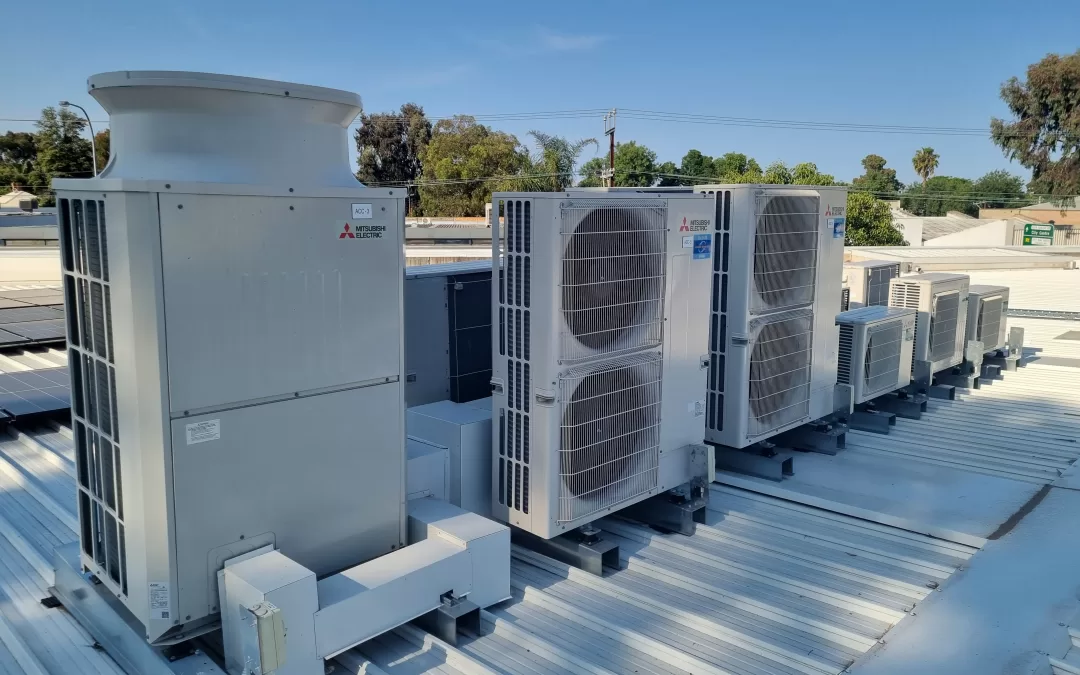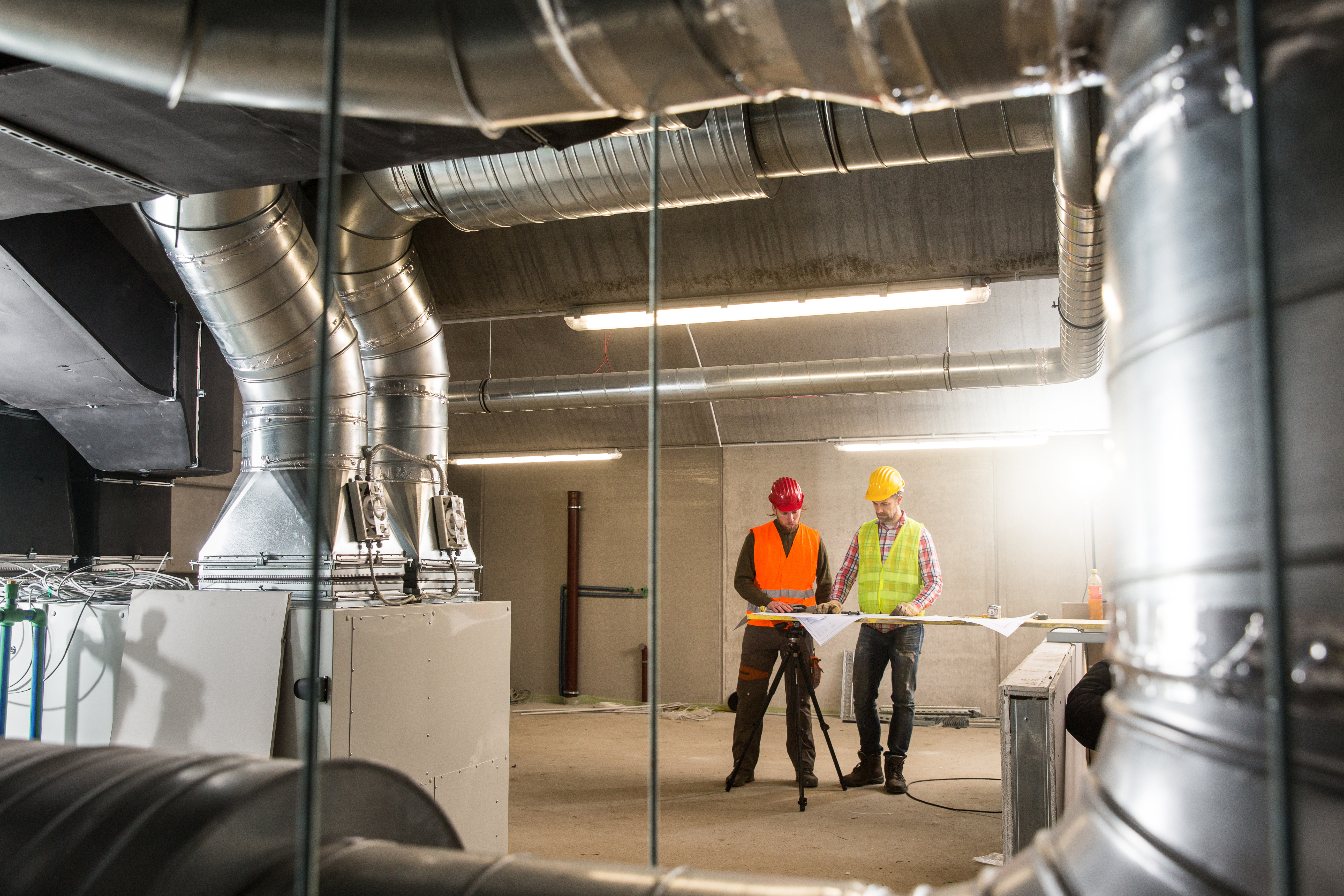Checking Out the Vital Parts of an Effective A/c System
An efficient cooling and heating system is developed on numerous essential parts that work in consistency. Each component, from the thermostat to the ductwork, plays an important role in keeping comfort and energy efficiency. Recognizing these components is essential for enhancing efficiency and boosting interior air top quality. As one takes a look at these parts, the detailed partnerships in between them disclose understandings into boosting overall system performance. What specific factors contribute most to this efficiency?
The Duty of the Thermostat in Cooling And Heating Efficiency

Often neglected, the thermostat plays an essential function in the performance of HVAC systems. This small tool serves as the key nerve center, managing temperature level setups and making certain excellent comfort within an area. By accurately noticing the ambient temperature, the thermostat interacts with the home heating, air, and air flow conditioning systems to keep the wanted climate
An effective thermostat reduces energy usage by triggering the HVAC system only when required, therefore avoiding too much home heating or cooling. Modern smart and programmable thermostats enhance this performance better by permitting customers to set schedules and remotely readjust settings, adapting to everyday regimens.
The placement of the thermostat is vital; inappropriate location can lead to unreliable temperature readings, resulting in inefficient operation. Overall, a well-functioning thermostat not only boosts convenience however likewise contributes markedly to energy financial savings and the longevity of the cooling and heating system.
Understanding the Importance of Air Filters
Air filters serve an essential feature in heating and cooling systems by ensuring that the air distributing within a room stays healthy and clean. These filters trap dirt, allergens, and various other contaminants, preventing them from being recirculated throughout the atmosphere. By recording these particles, air filters contribute to improved indoor air top quality, which can greatly benefit residents' health, particularly those with allergic reactions or respiratory conditions.
Additionally, keeping tidy air filters improves the performance of a/c systems. Stopped up filters can restrict airflow, causing the system to function tougher to keep wanted temperature levels, leading to increased energy intake and greater utility bills. Frequently replacing or cleaning filters is a vital maintenance step that can extend the life-span of cooling and heating equipment. Eventually, comprehending the significance of air filters enables property owners and building supervisors to take aggressive actions to guarantee a well-functioning, efficient HVAC system that promotes a comfy and safe indoor environment.

The Functionality of the Heater and Heatpump
Furnaces and heatpump are vital components of cooling and heating systems, liable for giving warmth during cooler months. Heating systems run by heating air via combustion or electrical resistance, then distributing it throughout the home through air ducts. They usually use quick heating and can be sustained by gas, electrical power, or oil, depending on the system type.
On the other hand, heatpump move warm as opposed to generate it. They remove heat from the outdoors air or ground, also in reduced temperatures, and move it indoors. HVAC experts. This double performance permits heatpump to likewise offer air conditioning in warmer months, making them flexible alternatives for year-round climate control
Both systems require appropriate maintenance to assure performance and longevity. While heating systems master severe chilly, heatpump can be beneficial in modest environments. Recognizing their unique capabilities help property owners in selecting one of the most ideal alternative for their home heating requires.
Exploring the Air Conditioning Device
The air conditioning system is an essential component of HVAC systems, readily available in various types to suit various requirements. Comprehending the performance scores of these systems is vital for making educated selections regarding power intake and price. This area will check out the diverse kinds of air conditioning unit and clear up just how performance rankings influence efficiency.
Kinds Of Air Conditioners
While various elements influence the option of a/c systems, understanding the various types offered is crucial for property owners and structure managers alike. Central air conditioning conditioners are made to cool down whole homes or buildings, making use of a network of ducts for airflow. Window units provide a more localized solution, perfect for small rooms or single areas. Portable ac system provide versatility, enabling users to relocate the system as needed. Ductless mini-split systems are another alternative, integrating the efficiency of main systems with the convenience of zoning, as they need no ductwork. Ultimately, geothermal systems harness the planet's temperature level for energy-efficient air conditioning. Each type comes with distinctive advantages, making educated selections necessary for effective environment control.

Effectiveness Rankings Described
Understanding effectiveness rankings is essential for picking the right air conditioning device, as these metrics supply insight right into the system's performance and energy intake. The most see here now common score for air conditioners is the Seasonal Power Performance Ratio (SEER), which gauges the cooling output during a common air conditioning period divided by the total electric energy input. A greater SEER suggests better effectiveness. Additionally, the Power Performance Ratio (EER) is used for gauging effectiveness under details conditions. An additional crucial metric is the Energy Star qualification, which symbolizes that an unit fulfills strict energy effectiveness standards. By assessing these ratings, customers can make educated choices that not just optimize comfort yet likewise decrease energy expenses and ecological influence.
The Relevance of Ductwork and Air movement
Effective ductwork style and air movement management play essential duties in the overall performance and efficiency of HVAC systems. Correct ductwork warranties that conditioned air is distributed equally throughout an area, minimizing temperature changes and boosting comfort. Well-designed air ducts minimize resistance to air movement, decreasing the work on a/c equipment and ultimately reducing power usage.
Air flow administration includes tactically putting vents and registers to enhance the circulation of air. This avoids usual concerns such as cool or hot areas, which can happen when air flow is obstructed or inadequately balanced. Additionally, the right air duct materials and insulation can additionally enhance efficiency by lowering warmth loss or gain throughout air transportation.
An effective ductwork system not only adds to energy savings yet can additionally extend the lifespan of heating and cooling equipment by reducing unneeded pressure (HVAC experts). Subsequently, comprehending the relevance of ductwork and air movement is crucial for attaining peak a/c system performance
Normal Upkeep Practices to Improve Performance
Normal maintenance techniques are crucial for making certain peak efficiency of heating and cooling systems. These techniques consist of regular examinations, cleaning, and necessary repair services to keep the system running efficiently. Regularly transforming air filters is vital, as clogged up filters can block airflow and lower efficiency. Additionally, service technicians must check and clean evaporator and condenser coils to prevent overheating and energy wastage.
Yearly professional evaluations are also recommended, as trained specialists can recognize possible concerns prior to they escalate. Oiling moving parts minimizes deterioration, adding to a longer life expectancy for the system. Making sure that the thermostat operates correctly aids in preserving ideal temperature level control.
Frequently Asked Concerns
Just how Commonly Should I Replace My Thermostat?
Thermostats must generally be replaced try here every 5 to one decade, relying on usage and innovation innovations. Regular checks are suggested to assure peak performance, particularly if experiencing irregular temperature level control or raised power prices.
What Dimension Air Filter Is Ideal for My Heating And Cooling System?
The best size air filter for a cooling and heating system differs by system design. Commonly, it's essential to consult the proprietor's guidebook or check the existing filter dimensions to ensure peak performance and air top quality.
Can I Set Up a Heatpump Myself?
Setting up a heatpump separately is feasible for competent individuals, but it calls for knowledge of neighborhood codes and electric systems. Hiring a specialist is recommended to guarantee correct setup and perfect system efficiency.
How Do I Know if My Ductwork Is Effective?
To establish ductwork effectiveness, one must look for leakages, step air movement at vents, examine insulation quality, and evaluate temperature differences in between supply and return ducts. Professional evaluations can supply detailed understandings into total efficiency.
What Are Indicators My Cooling And Heating Requirements Immediate Maintenance?
Signs that a HVAC system requires immediate upkeep include uncommon noises, inconsistent temperature levels, enhanced energy bills, undesirable odors, and constant biking. Attending to these problems immediately can protect against more damage and guarantee height system performance.
Air filters serve an important feature Get the facts in A/c systems by guaranteeing that the air distributing within a room continues to be tidy and healthy. Additionally, keeping clean air filters enhances the effectiveness of HVAC systems. Ductless mini-split systems are one more choice, integrating the performance of central systems with the benefit of zoning, as they need no ductwork. Understanding efficiency rankings is crucial for picking the appropriate air conditioning system, as these metrics give insight into the system's performance and power intake. The ideal size air filter for an A/c system varies by device design.